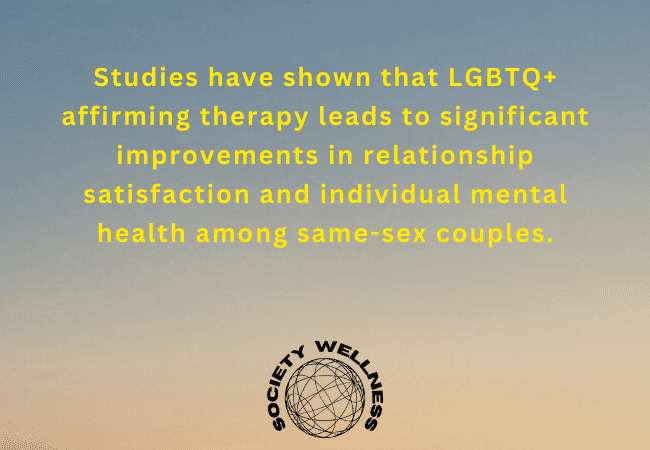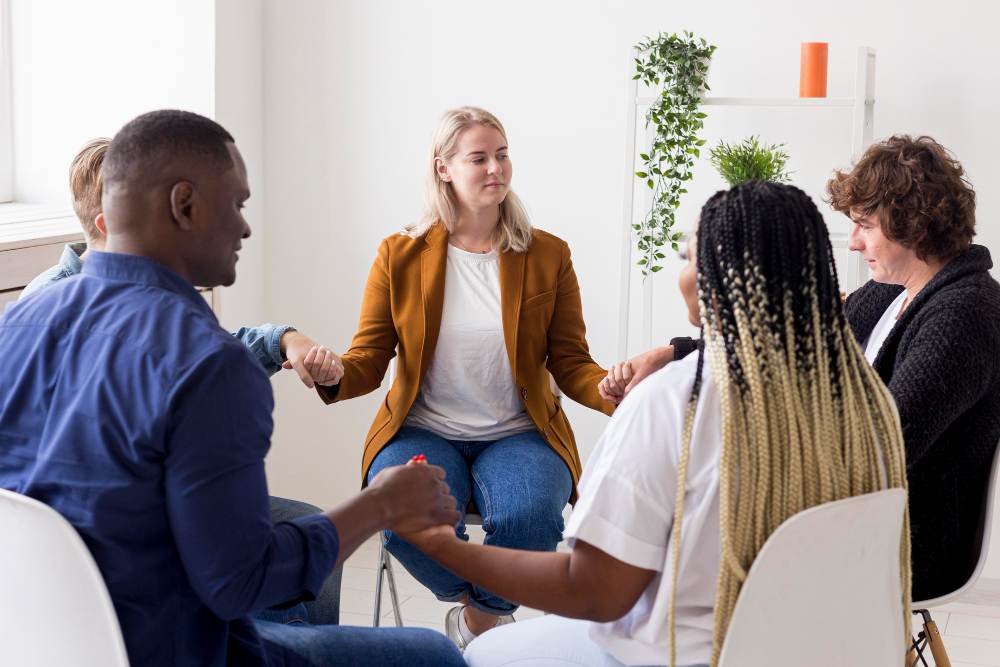Loving someone deeply is an act of vulnerability. For LGBTQ couples, that vulnerability often exists in a world where their identities, relationships, and families are not fully affirmed—or even recognized. The added pressures of discrimination, internalized stigma, and systemic barriers can seep into even the most loving partnerships.
LGBTQ couples therapy is more than relationship coaching. It’s a space where couples are validated, where identity is embraced, and where tools are built to strengthen the foundation of love and emotional connection. For queer and trans couples in Massachusetts, this form of therapy can be life-affirming and relationship-saving.
Whether you’re rebuilding trust, navigating a gender transition, managing conflict, or simply growing closer, LGBTQ couples counseling Massachusetts helps you create communication that’s grounded in love, and connection rooted in authenticity.
What Sets LGBTQ Couples Therapy Apart?
In many ways, LGBTQ couples face the same emotional complexities as any couple—communication challenges, mismatched expectations, shifting needs. But queer and trans couples must also contend with:
- Fear of social rejection
- Misgendering or lack of validation
- Trauma from past relationships or family dynamics
- Navigating non-traditional relationship structures
- Societal pressures to “prove” the legitimacy of their love
Traditional therapy often misses these nuances. That’s why queer-affirming providers in programs like Queer therapy Massachusetts are essential. They don’t just “tolerate” your identity—they celebrate and center it.
The Power of Communication in LGBTQ Relationships
Healthy communication is the lifeblood of intimacy. When communication breaks down, it creates distance, misunderstanding, and resentment. In LGBTQ relationships, communication challenges are often complicated by:
- Unspoken fears rooted in trauma
- Emotional withdrawal during transitions or dysphoric episodes
- Anxiety about being fully seen
- Miscommunication stemming from internalized shame or fear of judgment
Therapy creates space for authentic, safe, and respectful dialogue.
Through LGBTQ couples therapy, you’ll learn to:
- Identify and articulate your emotional needs
- Create repair after conflict
- Build trust through active listening
- Understand your partner’s communication style
- Respond with compassion instead of defense
How LGBTQ Couples Therapy Builds Stronger Emotional Bonds
1. Validating Each Partner’s Identity
Partners may experience different relationships with their gender, sexuality, or cultural background. A queer-affirming therapist helps both people feel seen without comparison or pressure to conform.
2. Deepening Emotional Intimacy
Therapy provides tools for cultivating intimacy—even when previous trauma has made it difficult to open up. Emotional safety is restored through honesty, consent, and empathy.
3. Managing Relationship Transitions
When a partner transitions, comes out, or changes their relationship boundaries, therapy becomes a neutral ground to explore:
- New roles, names, and pronouns
- Navigating visibility and disclosure
- Honoring grief, joy, and change at the same time
4. Balancing Differences in Attachment or Neurodivergence
Therapy helps identify and work through:
- Anxious-avoidant communication cycles
- Differences in how emotions are processed or expressed
- Autonomy vs. intimacy needs
How Therapy Helps LGBTQ Couples Break Communication Patterns Rooted in Trauma
Many LGBTQ people come into relationships with relational trauma, including:
- Family rejection
- Religious shaming
- Childhood abuse or bullying
- Previous unhealthy or abusive relationships
- Trauma from medical or legal systems
These experiences can lead to:
- Fear of abandonment
- People-pleasing or emotional suppression
- Inability to express needs
- Hypervigilance or emotional shutdown during conflict
Couples therapy helps you understand how trauma lives in your relationship—and what to do about it.
Therapists guide partners to:
- Recognize trauma-informed communication patterns
- Establish shared language for triggers and repair
- Practice nervous system regulation together
- Rebuild a sense of safety and reliability in the relationship
When trauma is acknowledged and respected—not pathologized—relationships become safer, more grounded, and emotionally free.
What LGBTQ Couples Therapy in Massachusetts Can Look Like
At an LGBTQ Behavioral Health Center in Massachusetts, you can expect:
- Therapists trained in queer, trans, and nonbinary identities
- Inclusive language and affirming clinical environments
- Awareness of polyamory, chosen family, and open relationships
- Integration of trauma-informed care
- Confidential, supportive, and customized sessions
Whether in person or through telehealth, therapy is tailored to your identity, your goals, and your love.
Therapy Formats and Program Options in Massachusetts
Some couples benefit from weekly sessions. Others need more structured care that addresses individual mental health concerns alongside relationship issues. That’s why centers across the state offer flexible treatment levels:
LGBTQ Partial Hospitalization Program Massachusetts (PHP)
- Day-long support for individuals facing acute mental health challenges
- Offers couples or family sessions to promote healing at home
- Includes group therapy, medication management, and trauma treatment
LGBTQ Intensive Outpatient Program Massachusetts (IOP)
- Several sessions per week for people stepping down from inpatient or PHP
- Includes skill-building, coping strategies, and relationship integration
- Great for those managing anxiety, depression, or trauma
LGBTQ Evening Outpatient in Massachusetts
- Designed for working couples or those with busy schedules
- Offers therapy and support in the evenings, online or in person
- Focus on long-term communication and emotional development

When Mental Health Affects the Relationship: Integrated Support Programs
Sometimes individual mental health symptoms disrupt connection. Massachusetts programs help couples address these challenges together.
LGBTQ Anxiety Treatment Program in Massachusetts
- Teaches coping tools for managing anxiety triggers
- Helps reduce reactivity in communication
- Builds trust through consistency and calm interactions
LGBTQ Depression Treatment Program in Massachusetts
- Supports couples when one or both partners feel disconnected or hopeless
- Focuses on emotional validation, behavioral activation, and mutual care
LGBTQ Trauma Treatment Program in Massachusetts
- Helps survivors of violence, abuse, or rejection rebuild intimacy
- Offers both individual and couples trauma processing
- Emphasizes boundaries, consent, and emotional regulation
LGBTQ Bipolar Treatment Program in Massachusetts
- Provides stabilization and communication strategies for mood shifts
- Helps couples navigate care plans, medication support, and relational impact
Common Goals LGBTQ Couples Bring to Therapy
- Learn how to argue constructively, not destructively
- Deepen intimacy without fear or shame
- Navigate coming out, transition, or visibility differences
- Explore open relationships or polyamory with safety and respect
- Heal from infidelity or broken trust
- Strengthen the relationship before major life decisions (e.g., moving in, parenting, marriage)
Signs Your Relationship Could Benefit from LGBTQ Couples Counseling
- You walk on eggshells during conflict
- One or both partners feel unseen or unheard
- There’s been a significant life change and you’re unsure how to adjust
- You’re feeling emotionally distant or sexually disconnected
- Past trauma is impacting trust, touch, or vulnerability
- You want to prevent future issues by improving communication now
Conclusion
LGBTQ love is radical, powerful, and worth protecting. Whether you’re celebrating years together or facing serious challenges, LGBTQ couples therapy in Massachusetts provides the structure, safety, and support you need to stay connected and grow together.
You deserve therapy that understands your story and honors your identities. That helps you build not just a relationship—but a relationship that’s strong, loving, and sustainable. Call LGBTQ Behavioral Health at 888.964.8116 today to connect with affirming couples counselors and explore programs built with your love in mind.
FAQ on LGBTQ Couples Therapy and Communication
Why is LGBTQ-specific couples therapy important?
LGBTQ couples face unique relationship stressors, including identity exploration, discrimination, family rejection, and trauma. LGBTQ-affirming therapy provides a safe space to process these challenges while strengthening emotional intimacy and communication.
What makes LGBTQ couples therapy different from traditional couples counseling?
Traditional therapy often centers heteronormative, monogamous dynamics. LGBTQ couples therapy recognizes non-traditional relationships, gender diversity, chosen family structures, and the impact of societal stigma. It affirms your love without judgment.
How does therapy help improve communication between LGBTQ partners?
Therapists help partners express needs, resolve conflict, and respond with empathy rather than defensiveness. Couples learn how past trauma or internalized stigma affects communication and how to build trust through active listening and emotional presence.
Can couples therapy support us if one or both partners are managing mental health issues?
Yes. LGBTQ couples therapy can be integrated with individual mental health treatment. Programs like the LGBTQ Anxiety, Depression, Trauma, and Bipolar Treatment Programs in Massachusetts provide wraparound support for relationships impacted by mental illness.
What types of LGBTQ therapy programs are available in Massachusetts?
Available services include:
-
LGBTQ Couples Therapy & Counseling Massachusetts
-
Queer Therapy Massachusetts
-
LGBTQ Partial Hospitalization Program (PHP)
-
LGBTQ Intensive Outpatient Program (IOP)
-
LGBTQ Evening Outpatient Sessions
-
Targeted programs for trauma, depression, anxiety, and more
How can we get started with LGBTQ couples therapy in Massachusetts?
Call LGBTQ Behavioral Health at 888.964.8116 to speak with a care coordinator who can match you with a licensed, affirming couples therapist or help you enroll in one of our inclusive mental health programs.

